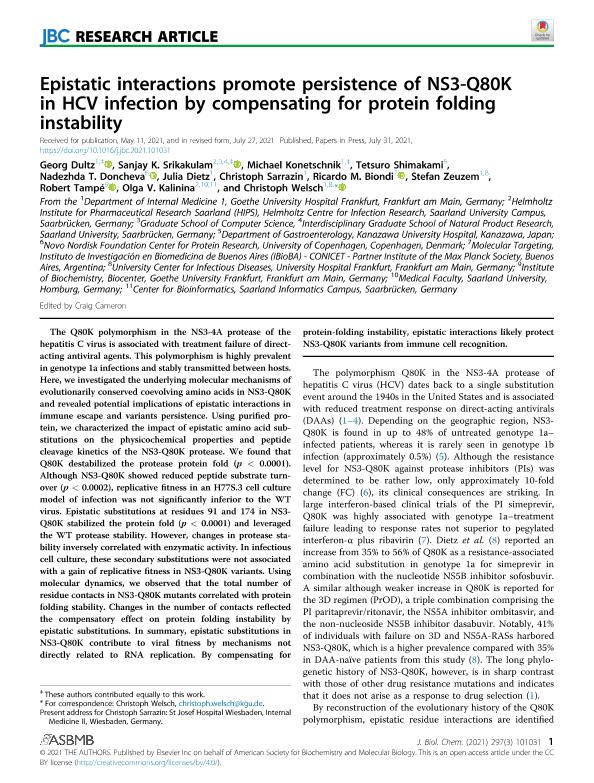Mostrar el registro sencillo del ítem
dc.contributor.author
Dultz, Georg
dc.contributor.author
Srikakulam, Sanjay K.
dc.contributor.author
Konetschnik, Michael
dc.contributor.author
Shimakami, Tetsuro
dc.contributor.author
Doncheva, Nadezhda T.
dc.contributor.author
Dietz, Julia
dc.contributor.author
Sarrazin, Christoph
dc.contributor.author
Biondi, Ricardo Miguel

dc.contributor.author
Zeuzem, Stefan
dc.contributor.author
Tampé, Robert
dc.contributor.author
Kalinina, Olga V.
dc.contributor.author
Welsch, Christoph
dc.date.available
2023-01-24T15:45:18Z
dc.date.issued
2021-09
dc.identifier.citation
Dultz, Georg; Srikakulam, Sanjay K.; Konetschnik, Michael; Shimakami, Tetsuro; Doncheva, Nadezhda T.; et al.; Epistatic interactions promote persistence of NS3-Q80K in HCV infection by compensating for protein folding instability; Elsevier; Journal of Biological Chemistry (online); 297; 3; 9-2021; 1-12
dc.identifier.issn
0021-9258
dc.identifier.uri
http://hdl.handle.net/11336/185424
dc.description.abstract
The Q80K polymorphism in the NS3-4A protease of the hepatitis C virus is associated with treatment failure of directacting antiviral agents. This polymorphism is highly prevalent in genotype 1a infections and stably transmitted between hosts. Here, we investigated the underlying molecular mechanisms of evolutionarily conserved coevolving amino acids in NS3-Q80K and revealed potential implications of epistatic interactions in immune escape and variants persistence. Using purified protein, we characterized the impact of epistatic amino acid substitutions on the physicochemical properties and peptide cleavage kinetics of the NS3-Q80K protease. We found that Q80K destabilized the protease protein fold (p < 0.0001). Although NS3-Q80K showed reduced peptide substrate turnover (p < 0.0002), replicative fitness in an H77S.3 cell culture model of infection was not significantly inferior to the WT virus. Epistatic substitutions at residues 91 and 174 in NS3- Q80K stabilized the protein fold (p < 0.0001) and leveraged the WT protease stability. However, changes in protease stability inversely correlated with enzymatic activity. In infectious cell culture, these secondary substitutions were not associated with a gain of replicative fitness in NS3-Q80K variants. Using molecular dynamics, we observed that the total number of residue contacts in NS3-Q80K mutants correlated with protein folding stability. Changes in the number of contacts reflected the compensatory effect on protein folding instability by epistatic substitutions. In summary, epistatic substitutions in NS3-Q80K contribute to viral fitness by mechanisms not directly related to RNA replication. By compensating for protein-folding instability, epistatic interactions likely protect NS3-Q80K variants from immune cell recognition.
dc.format
application/pdf
dc.language.iso
eng
dc.publisher
Elsevier

dc.rights
info:eu-repo/semantics/openAccess
dc.rights.uri
https://creativecommons.org/licenses/by/2.5/ar/
dc.subject
HEPATITIS C
dc.subject
HCV
dc.subject
NS3
dc.subject
TEMPERATURE STABILITY
dc.subject.classification
Bioquímica y Biología Molecular

dc.subject.classification
Ciencias Biológicas

dc.subject.classification
CIENCIAS NATURALES Y EXACTAS

dc.title
Epistatic interactions promote persistence of NS3-Q80K in HCV infection by compensating for protein folding instability
dc.type
info:eu-repo/semantics/article
dc.type
info:ar-repo/semantics/artículo
dc.type
info:eu-repo/semantics/publishedVersion
dc.date.updated
2022-10-04T10:51:57Z
dc.journal.volume
297
dc.journal.number
3
dc.journal.pagination
1-12
dc.journal.pais
Países Bajos

dc.journal.ciudad
Amsterdam
dc.description.fil
Fil: Dultz, Georg. Goethe Universitat Frankfurt; Alemania
dc.description.fil
Fil: Srikakulam, Sanjay K.. Universitat Saarland; Alemania
dc.description.fil
Fil: Konetschnik, Michael. Goethe Universitat Frankfurt; Alemania
dc.description.fil
Fil: Shimakami, Tetsuro. Kanazawa University Hospital; Japón
dc.description.fil
Fil: Doncheva, Nadezhda T.. Universidad de Copenhagen; Dinamarca
dc.description.fil
Fil: Dietz, Julia. Goethe Universitat Frankfurt; Alemania
dc.description.fil
Fil: Sarrazin, Christoph. Goethe Universitat Frankfurt; Alemania
dc.description.fil
Fil: Biondi, Ricardo Miguel. Consejo Nacional de Investigaciones Científicas y Técnicas. Oficina de Coordinación Administrativa Parque Centenario. Instituto de Investigación en Biomedicina de Buenos Aires - Instituto Partner de la Sociedad Max Planck; Argentina
dc.description.fil
Fil: Zeuzem, Stefan. Goethe Universitat Frankfurt; Alemania
dc.description.fil
Fil: Tampé, Robert. Goethe Universitat Frankfurt; Alemania
dc.description.fil
Fil: Kalinina, Olga V.. Universitat Saarland; Alemania
dc.description.fil
Fil: Welsch, Christoph. Goethe Universitat Frankfurt; Alemania
dc.journal.title
Journal of Biological Chemistry (online)

dc.relation.alternativeid
info:eu-repo/semantics/altIdentifier/url/https://linkinghub.elsevier.com/retrieve/pii/S0021925821008334
dc.relation.alternativeid
info:eu-repo/semantics/altIdentifier/doi/http://dx.doi.org/10.1016/j.jbc.2021.101031
Archivos asociados
